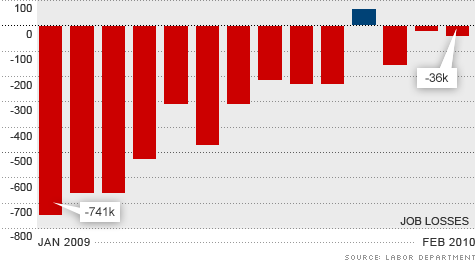Search News

NEW YORK (CNNMoney.com) -- As severe winter storms crippled East Coast cities, the U.S. economy shed thousands of jobs in February, according to a government report released Friday. But the unemployment rate remained unchanged.
The Labor Department said the economy lost 36,000 jobs in the month, fewer than the 68,000 jobs economists were expecting, according to a survey conducted by Briefing.com.
The results were still worse than the previous month, as just 26,000 jobs were lost in January, according to a revised estimate.
But there was no significant change in the number of unemployed workers, and the unemployment rate held steady at 9.7%. Economists surveyed by Briefing.com were expecting an increase to 9.8%.
The government said the winter storms that blanketed the East Coast with several feet of snow last month possibly skewed the results. The Labor Department's jobs survey was conducted in the middle of February, which coincided with blizzards that temporarily shuttered some businesses and kept many workers home without pay.
Those employees would not have been counted on the government's payroll survey if they did not get paid during that pay period.
"The jobs numbers themselves show a pretty steady improvement across most categories," said Bob Brusca, economist at FAO Economics. "Through the blizzard of jobs data, it's a lot easier to connect the dots to a positive story than to a negative story."
Brusca noted that even in sectors that are not hiring, the pace of job loss has slowed to close to the lowest level since the recession began in December 2007.
"The snow storms were particularly severe, hitting large-population areas the hardest right at the time of the survey," said George Corona, chief operating officer of temporary staffing firm Kelly Services. "You would expect that manufacturing and construction were negatively impacted because of the weather."
Retail, construction and factory workers were the most likely to be impacted by inclement weather, and all three sectors took a hit in February. Retailers trimmed 400 jobs after adding 41,000 positions in January. Manufacturing businesses added just 1,000 jobs, down from 20,000 new jobs the month before.
Construction continued to be one of the worst-hit sectors, cutting 64,000 jobs in February. Unemployment in the construction industry rose to a rate of 27.1%, up from 24.7% in the previous month and by far the highest rate of any sector.
The snow also likely impacted the number of workers who were seeking full-time employment but were working only part-time hours. That figure rose by nearly 400,000, pushing the so-called underemployment rate up to 16.8% from 16.5% in January.
That resulted in shorter hours for workers: The hourly work week fell by an average of 6 minutes to 33.8 hours in February. With a modest 3-cent gain in the average hourly salary, the average weekly paycheck rose by $1.01 to $759.15.
Obama administration economist Christina Romer said the snow storms likely had a "substantial" impact on February's jobs figures. In turn, she expected last month's jobs report "to be counteracted next month, as workers who temporarily disappeared from payrolls because of the snow are once again counted."
Despite the snow, several industries showed solid gains in employment, including health care and the service industries. Private business services created 51,000 jobs in February, the most of any sector. That's encouraging, since economists say hiring in that sector is a good measuring stick for the health of the overall labor market.
Also encouraging was the addition of 47,500 temporary workers, whose hiring often signals that employers are starting to gear up again. There have been nearly 100,000 temporary jobs created in 2010.
In an attempt to correct the still slumping labor market, the House passed a $15 billion jobs bill on Thursday, and the Senate is expected to vote on it next week. The bill would exempt employers from Social Security payroll taxes on new hires who were unemployed; fund highway and transit programs through 2010; extend a tax break for business that spend money on capital investments, such as equipment purchases; and expand the use of the Build America Bonds program, which helps states and municipalities fund capital construction projects. ![]()






| Index | Last | Change | % Change |
|---|---|---|---|
| Dow | 32,627.97 | -234.33 | -0.71% |
| Nasdaq | 13,215.24 | 99.07 | 0.76% |
| S&P 500 | 3,913.10 | -2.36 | -0.06% |
| Treasuries | 1.73 | 0.00 | 0.12% |
| Company | Price | Change | % Change |
|---|---|---|---|
| Ford Motor Co | 8.29 | 0.05 | 0.61% |
| Advanced Micro Devic... | 54.59 | 0.70 | 1.30% |
| Cisco Systems Inc | 47.49 | -2.44 | -4.89% |
| General Electric Co | 13.00 | -0.16 | -1.22% |
| Kraft Heinz Co | 27.84 | -2.20 | -7.32% |
|
Bankrupt toy retailer tells bankruptcy court it is looking at possibly reviving the Toys 'R' Us and Babies 'R' Us brands. More |
Land O'Lakes CEO Beth Ford charts her career path, from her first job to becoming the first openly gay CEO at a Fortune 500 company in an interview with CNN's Boss Files. More |
Honda and General Motors are creating a new generation of fully autonomous vehicles. More |
In 1998, Ntsiki Biyela won a scholarship to study wine making. Now she's about to launch her own brand. More |
Whether you hedge inflation or look for a return that outpaces inflation, here's how to prepare. More |